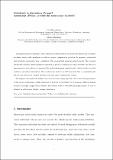A Simulation-Based Optimization Framework for Urban Transportation Problems
Author(s)
Bierlaire, Michel; Osorio Pizano, Carolina
DownloadOsorio_A simulation-based.pdf (433.0Kb)
OPEN_ACCESS_POLICY
Open Access Policy
Creative Commons Attribution-Noncommercial-Share Alike
Terms of use
Metadata
Show full item recordAbstract
This paper proposes a simulation-based optimization (SO) method that enables the efficient use of complex stochastic urban traffic simulators to address various transportation problems. It presents a metamodel that integrates information from a simulator with an analytical queueing network model. The proposed metamodel combines a general-purpose component (a quadratic polynomial), which provides a detailed local approximation, with a physical component (the analytical queueing network model), which provides tractable analytical and global information. This combination leads to an SO framework that is computationally efficient and suitable for complex problems with very tight computational budgets.
We integrate this metamodel within a derivative-free trust region algorithm. We evaluate the performance of this method considering a traffic signal control problem for the Swiss city of Lausanne, different demand scenarios, and tight computational budgets. The method leads to well-performing signal plans. It leads to reduced, as well as more reliable, average travel times.
Date issued
2013-12Department
Massachusetts Institute of Technology. Department of Civil and Environmental EngineeringJournal
Operations Research
Publisher
Institute for Operations Research and the Management Sciences (INFORMS)
Citation
Osorio, Carolina, and Michel Bierlaire. “A Simulation-Based Optimization Framework for Urban Transportation Problems.” Operations Research 61, no. 6 (December 2013): 1333–1345.
Version: Author's final manuscript
ISSN
0030-364X
1526-5463